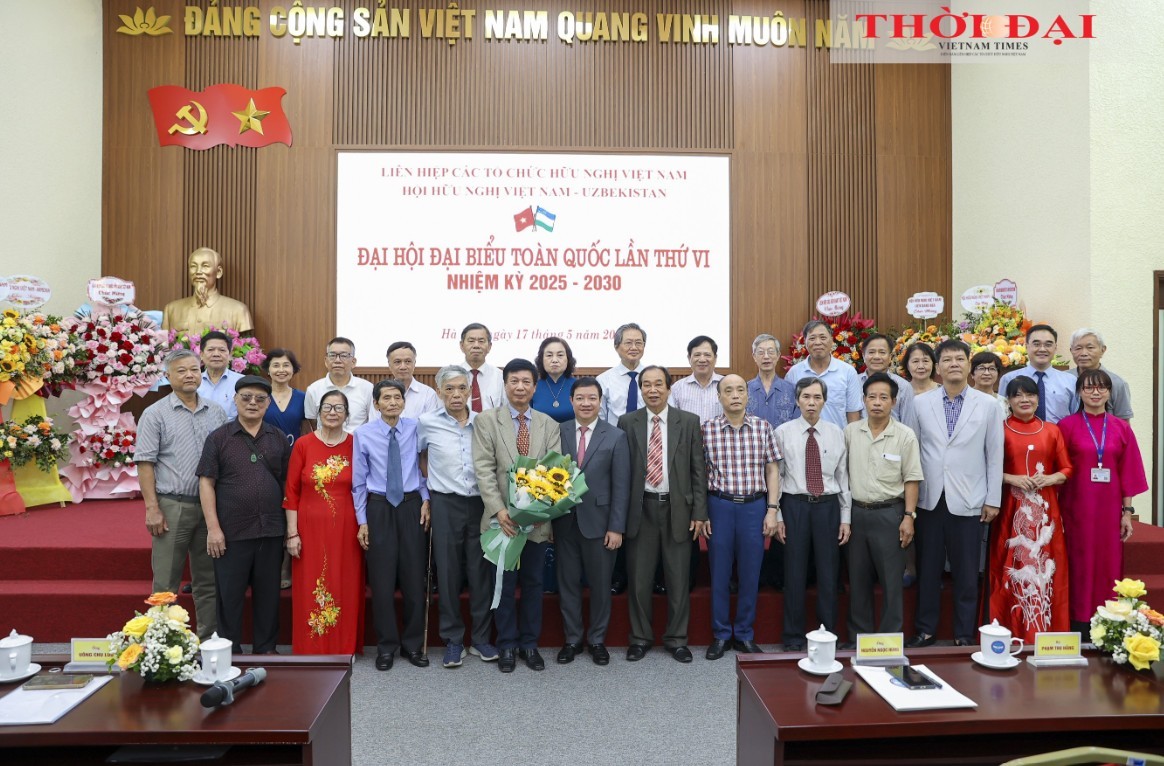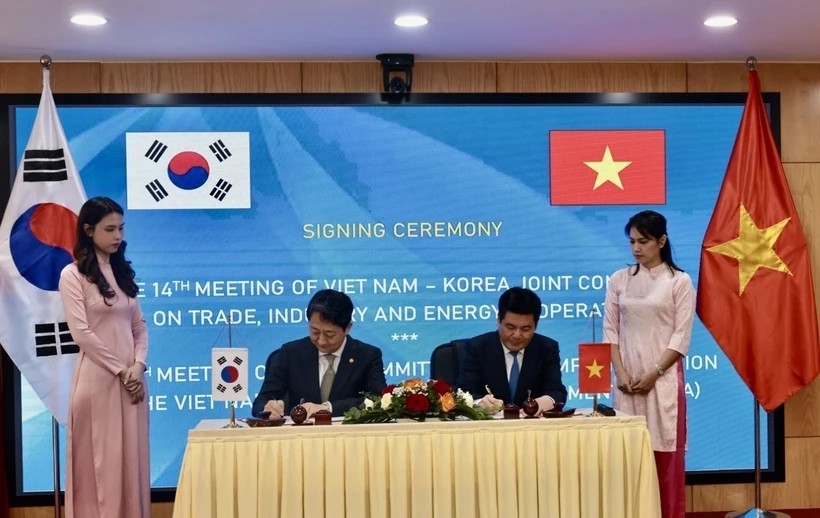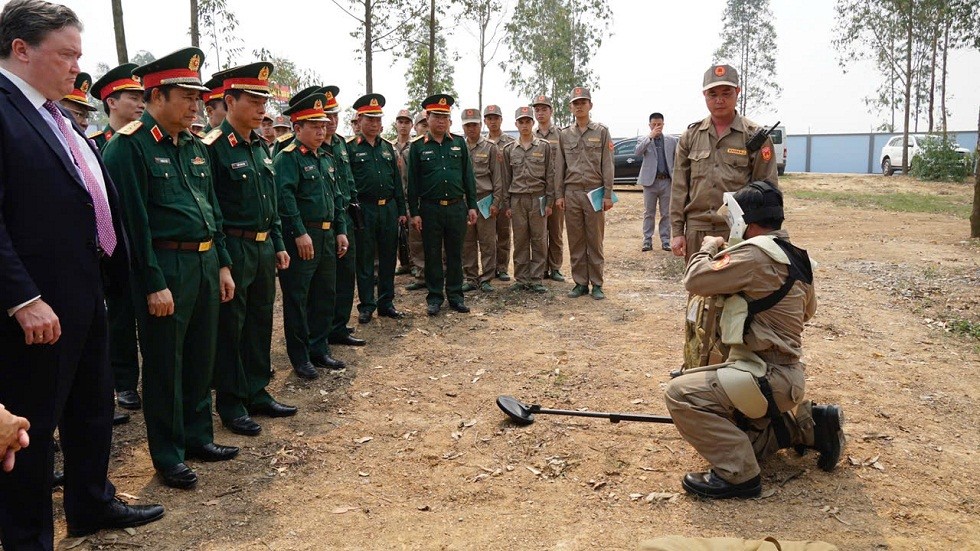Promoting Gender Equality is Key to Ending Son Preference
The preference of having a son remains a pervasive form of gender inequality and discrimination in a number of countries in Asia, the Balkans and the Caucasus, as well as in Africa. According to the State of World Population Report published by the United Nations Population Fund (UNFPA) in 2020, globally, more than 140 million females are considered ‘missing’ due to preference of sons over daughters.
 |
| A H’Mong young girl at a village of Ha Giang province. Photo: Tran Tuan Duy |
In an effort to foster concerted action to address son preference and gender-biased sex selection, UNFPA organized a policy dialogue with decision-makers, experts, and representatives from eight countries, namely: Armenia, Azerbaijan, Bangladesh, China, Georgia, India, Nepal, and Vietnam.
The workshop, taking place in Hanoi, from October 4- 6, also saw the participation of ambassadors and representatives from Australia, Canada, Norway and Sweden.
“Son preference and gender-biased sex selection are, first and foremost, an issue of gender inequality and a violation of human rights,” said Regional Director for UNFPA Asia and the Pacific, Bjorn Andersson.
“We must address social norms that diminish the value of girls and women, and support national and community efforts which strive to address preference for sons and sex selection. It is encouraging to see many experts and government officials, as well as civil society representatives coming together to share their knowledge and learnings. The gathering also reinforces the importance of south-south collaboration in promoting gender equality and rights, and ending gender-based discrimination and harmful practices,” added Andersson.
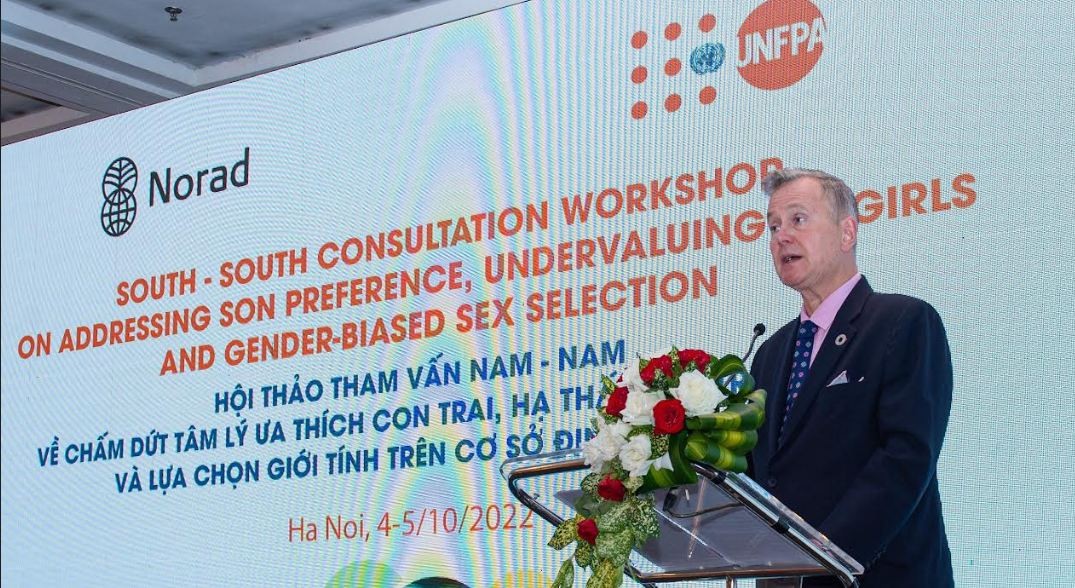 |
| Bjorn Andersson, regional director for UNFPA Asia and the Pacific speaks at the two-day workshop on son preference, undervaluing of girls and gender-biased sex selection in Hanoi. Source: UNFPA Vietnam |
Moreover, an extreme preference for sons over daughters in some countries has fueled gender-biased sex selection or extreme neglect that leads to their death as children, resulting in 140 million “missing females.”
From the 1980s to the 1990s, the world saw about 25% higher rates of boys being born than girls in countries like China, India, Vietnam, Bangladesh, Nepal, Azerbaijan, Armenia and Georgia.
Gender-biased sex selection has far-reaching harmful and negative impacts on societies including increased maternal deaths, sexual violence, imbalanced sex ratios, and human trafficking. UNFPA’s response focuses on tackling gender inequality - the root cause of son preference – by working with partners at all levels, from policy makers to individuals and communities, to bring about behaviour and policy change.
“UNFPA once again calls for attention and accelerates efforts to develop policies and programmes aimed at ending all forms of discrimination on the basis of gender, including son preference and gender-biased sex selection,” Andersson highlighted.
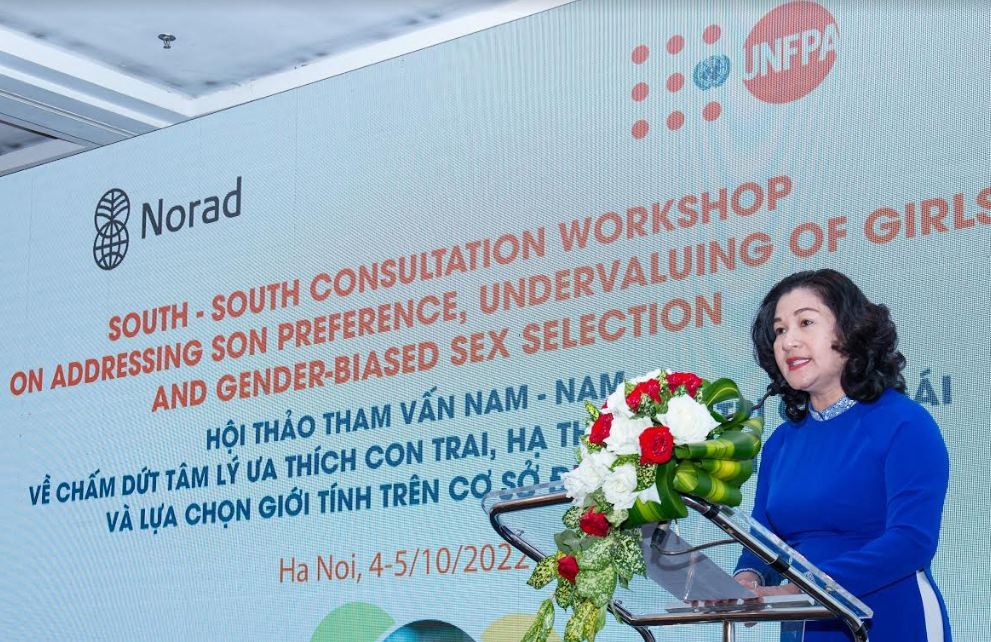 |
| Nguyen Thi Ha, vice minister of Labour, Invalids and Social Affairs delivers a speech at the two-day workshop on son preference, undervaluing of girls and gender-biased sex selection. Source: UNFPA Vietnam |
Speaking at the opening session on October 4, Vice Minister of Labour, Invalids and Social Affairs (MOLISA), Nguyen Thi Ha, said, “In Vietnam, gender equality is a cross-cutting issue in all the guidelines of the Party and State of Vietnam and is part of the country’s socio-economic development strategy which aims to build Vietnam into a prosperous, democratic, and fair country, thus ensuring national security and sustainable development. Vietnam has issued policies and legal frameworks as well as many solutions and interventions to address gender-biased sex selection.”
However, sex selection on the basis of gender stereotypes continued to persist in society. This practice had been identified as the main cause of the imbalance in the sex ratio at birth in Vietnam.
According to the Population and Housing Census, the sex ratio at birth in 2021 was 112 boys per 100 girls. The rate without any human intervention is 105 boys per 100 girls. It is forecast that by 2034, Vietnam will have an excess of 1.5 million men aged 15-49 and the number will reach 2.5 million by 2059.
"Bringing the sex ratio at birth to the natural rate is one of the goals of the National Strategy on Gender Equality for the 2021-2030 period," she said.
On the third-day of the gathering, the participants will visit the Bac Giang province to learn how the Vietnam Farmers’ Union is tackling gender-biased sex selection through the ‘Fatherhood Programme’, a UNFPA-supported innovative strategy to engage young men in building healthy family relationships in the country.
“We have clearly created a movement by setting up policy and legal frameworks, introducing innovative and communication activities geared towards behavioural change driven by young people, and providing integrated services.” said Naomi Kitahara, UNFPA Representative in Vietnam. “This is one of the best partnerships I have seen between the Government, development partners, society organizations and UNFPA, working together to achieve a common objective in addressing gender-biased sex selection.”
“It is important that we stay on track, so that we can begin to deliver and fully refine to ensure maximum impact of joint interventions throughout the years,” she stressed.
Within his visit to Vietnam for the South-South Consultation workshop on addressing son preference, undervaluing of girls and gender-biased sex selection, UNFPA Asia and the Pacific Regional Director Björn Andersson also had meetings with Deputy Foreign Minister Ha Kim Ngoc, MOLISA Vice Minister Nguyen Thi Ha and Deputy Minister of Home Affairs Vu Chien Thang along with Chair of the National Assembly’s Committee for Social Affairs Nguyen Thuy Anh and Vice Chair of the National Assembly’s Committee for Culture and Education Ta Van Ha.
Andersson appreciated the important role of the Vietnam's ministries and committees; discussed current population shifts and dynamics, as well as common objectives and strategic interventions to end violence against women and gender-biased sex selection in Vietnam.
Andersson also reaffirmed UNFPA’s commitment to continue supporting the Vietnam's Government on the way to achieving the Sustainable Development Goals by 2030.
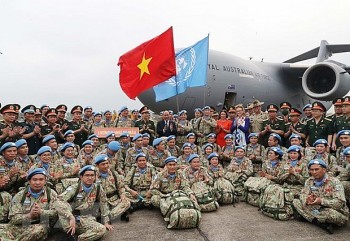 | Vietnam Called A Development Success Story International organisations and foreign experts have hailed Vietnam as a success story about economic development, social welfare and human rights guarantee. |
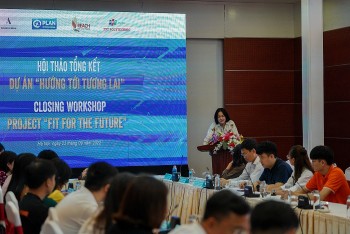 | Bridging Digital Gender Divide for Disadvantaged Youths A closing workshop for the “Fit for Future” project, bridging the gender gap in the Information & Communication Technologies industry for disadvantaged youths was held ... |
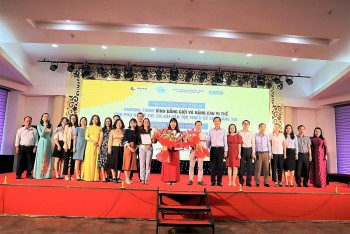 | Gender Equality and Empowerment for Ethnic Minority Girls in Quang Tri The protection, care and education of children, especially those from ethnic minority groups, remote, border and island areas, have always been a priority for Vietnam. |
Recommended
 World
World
‘We stand with India’: Japan, UAE back New Delhi over its global outreach against terror
 World
World
'Action Was Entirely Justifiable': Former US NSA John Bolton Backs India's Right After Pahalgam Attack
 World
World
US, China Conclude Trade Talks with Positive Outcome
 World
World
Nifty, Sensex jumped more than 2% in opening as India-Pakistan tensions ease
Popular article
 World
World
Easing of US-China Tariffs: Markets React Positively, Experts Remain Cautious
 World
World
India strikes back at terrorists with Operation Sindoor
 World
World
India sending Holy Relics of Lord Buddha to Vietnam a special gesture, has generated tremendous spiritual faith: Kiren Rijiju
 World
World




